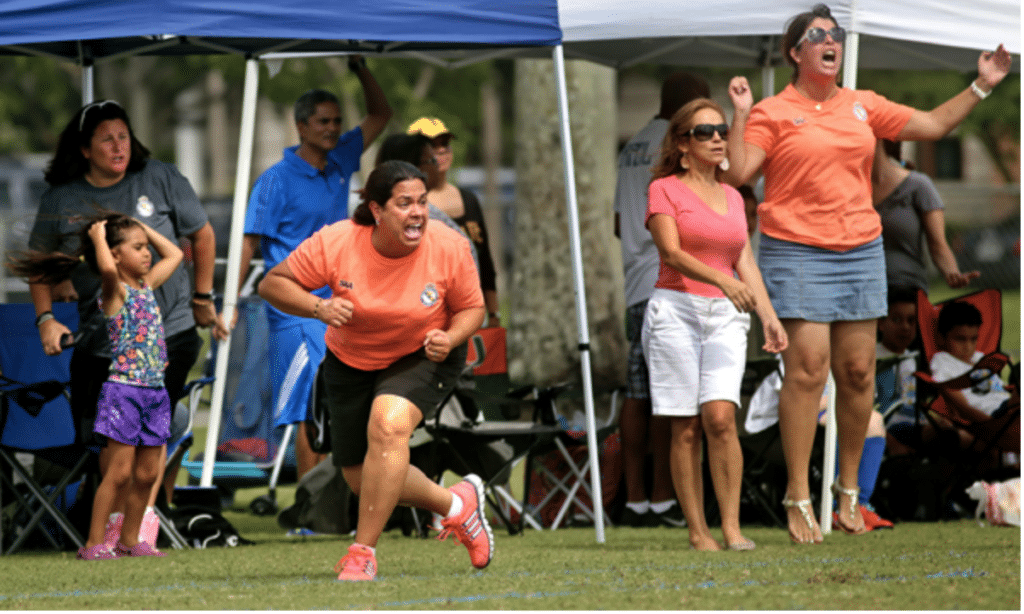Tips for Parents might be the most difficult category of article for me to write. Why? I’m the parent of two high performing baseball players and I’ve made plenty of mistakes throughout their journeys from t-ball to college. The truth is, I wish I’d had access to a certified mental performance coach when I was up to my elbows in red-clay-stains and sunflower seed husks. That’s why I feel called to share what I’ve learned. My words are not meant as condemnation, rather to shed light on this important topic because what you may not know is your words and actions have the power to sabotage your child’s athletic pursuits or catapult him or her toward success. As you read this article, I hope you will keep an open mind. If you recognize yourself, don’t panic. There’s a section at the very end called TIPS FOR EVALUATING YOUR BEHAVIOR AND SHIFTING YOUR MINDSET because you’re not alone.
I’m the parent of two high performing baseball players and I’ve made plenty of mistakes throughout their journeys from t-ball to college.

Common Pitfalls of Parenting Your Athlete
1. Living vicariously through your child
As parents, we want our children to be happy and successful, but when our behavior is driven by regret over our own unfulfilled athletic dreams it becomes a slippery slope. Following are some signs you might be projecting your own athletic goals onto your children.
- When your child performs well, you talk incessantly about it to friends, coworkers, family members, the person behind you in the check-out line at the grocery store and basically anyone who will listen. You may also post excessively on social media. Often, you are happier when your child performs well than your child is.
- You become overly upset or frustrated when your child makes a mistake and worry about the impact it has on the opinions of others. More often than not, you are more disappointed when your child performs poorly than he or she is.
- You are constantly searching for something better – a better team, coach, instructor, showcase, clinic, recruiter, equipment, etc. – without your child wanting or requesting it.
2. Praising performance results rather than effort
Research in neuroscience demonstrates not all praise is the same. In fact, when we praise results over effort it can cause our children to develop low self-worth, especially if they feel no amount of effort will ever please us as much as a win. On the other hand, praising effort over results enhances self-worth, confidence, determination, persistence and resilience – all factors which contribute to developing a growth mindset and mental strength. Athletes who see the world through the filter of a growth mindset are motivated by a deep and lasting passion for their sport that goes beyond winning. They are receptive to critical feedback and are more likely to become peak performers than their peers with fixed or negative mindsets. Following are some signs you might be praising results rather than effort.
- Your child’s performance results are your top priority and often eclipse the value you place on effort and the learning process.
- You may not say it, but your behavior and body language imply winning represents success.
- You may not say it, but your behavior and body language imply losing represents failure.
3. Being overly critical
Children inherently want to please their parents. Overly critical or excessively demanding parents subject their children to intense pressure and undue stress. This not only undermines the benefits associated with participating in sports, it kills enthusiasm, hinders enjoyment and keeps them from performing up to their potential. Following are some signs you might be overly critical.

On the car ride home, you perform an appraisal of your child’s performance, focusing primarily on your child’s shortcomings.
- After games and competitions, and usually on the car ride home, you perform an appraisal of your child’s performance, focusing primarily on mistakes and shortcomings.
- You fail to applaud your child’s small victories – personal bests, incremental improvement, good sportsmanship, a positive attitude, etc. – and instead give pointers on how the performance could have been better.
- You are unable to regulate your emotions or conceal your own disappointment over a mistake or a poor performance.
4. Coaching from the sidelines
Coaching from the sidelines is one of the most destructive habits I see in parents of athletes because it rarely produces better results. What I’ve witnessed from my combined experience as an athlete, mental performance coach, gymnastics coach and baseball mom is that the overwhelming majority of what comes out of a parent’s mouth when coaching from the sidelines is a mixture of fundamentally wrong and entirely irrelevant. This is a disastrous combination and even if what is being shrieked from the bleachers has a modicum of value, it still serves only to confuse, distract and embarrass the child. Leave the coaching to the coaches and you stick to being your kid’s number one fan. Following are some signs you are coaching from the sidelines.

The overwhelming majority of what comes out of a parent’s mouth when coaching from the sidelines is a mixture of fundamentally wrong and entirely irrelevant.
Photo credit: Mike Stocker, South Florida Sun Sentinel.
- You are unable to control your compulsion to give your child “helpful tips” during games or competitions.
- You become anxious when your child isn’t performing well and shout cues – often in the form of overzealous cheering – aimed at reminding him or her what to do in order to play better. This may alleviate your stress, but it exponentially increases your child’s stress.
- You notice your child becomes distracted or embarrassed when they hear your voice, attempts to ignore you, and/ or is sullen and unresponsive after games, even after winning or performing well.
5. Cultivating excessive extrinsic motivation
Intrinsic motivation refers to doing something because it is interesting, fulfilling, and fun. Extrinsic motivation refers to doing something for external reasons such as receiving a reward or avoiding punishment. While extrinsic motivation is not entirely bad – for example, many competitive athletes are motivated by a desire to win – research indicates that in order to sustain a commitment to something over a long period of time, the overriding motivation must be intrinsic. Some youth athletes may require a little external motivation throughout their journeys, but it is important to be careful not to rely exclusively on bribes, rewards or punishment. Too many dangling carrots can thwart intrinsic motivation. Following are some signs you might be cultivating excessive extrinsic motivation.
- You have to drag or bribe your child to go to practice.
- You have to remind or push your child to do drills and condition outside of regular practice/lessons.
- You incentivize your child to perform well, work hard, etc. with bribes.
- You threaten your child with extra drills, conditioning or other forms of punishment for poor performances.
- Your child seems like he or she is going through the motions and not fully engaged in practicing or games.
- You have trouble comprehending that your child wants to skip practice or games in order to take part in other activities.
TIps for evaluating your behavior and shifting your mindset
What motivates us as parents is love for our children. Sometimes we just go about ensuring they are healthy, happy and safe from harm in all the wrong ways. If you recognize yourself in any of the pitfalls described, allow yourself a few minutes of grace and then take a long, hard look at yourself in the mirror. Evaluate yourself, acknowledge whether you are causing more harm than good, and resolve to shift your mindset in order to change your behavior in ways that benefit your child. Parents who are truly content and happy with their own lives are rarely reactionary, overly critical nor do they attempt to vicariously relive their glory days via their children’s athletic careers.
Allow yourself a few minutes of grace and then take a long, hard look at yourself in the mirror.

1. It’s your child’s athletic journey, not yours
From the moment we first cradle them in our arms as newborns until our last breath on earth, we have dreams and hopes for our children. While it is our responsibility to teach and guide them, it is important remember THEY are the architects of their own lives. As the parent of an athlete, your job is to tap into your child’s WHY Factor – that is, the reasons for playing sports. Whether it’s to have fun, to spend time with friends, to earn a college scholarship, to make an Olympic team or to become a professional athlete, your child’s goals always supersede yours. Your job is to provide support and encouragement so your child has the confidence, motivation and courage to chase those dreams. When this becomes your objective and your child is free from the pressure of meeting your expectations, he or she will soar. Remember, it’s your child’s athletic journey, not yours.
2. Cultivate fun
Research studies devoted to finding out why kids play sports consistently render the same overwhelming results: it’s fun. As kids get older they become more and more competitive, but when polled, even high school and college athletes report fun plays a major role in why they play sports. Sadly, around 70% of youth athletes quit playing sports by the age of 13, claiming it’s not fun anymore. We’re already fighting an uphill battle in our “winning is everything” culture, but adding overly critical and excessively demanding parents to the equation is a guaranteed fun squelcher. When making certain your child is having fun becomes your objective, your child is more likely to stay motivated, continue to improve and remain involved in sports for a very long time because… kid’s just want to have fun!
4. Leave the coaching to the coaches
Some of the greatest athletes were molded by their parents – golfer, Tiger Woods and tennis players, Venus and Serena Williams immediately come to mind – but this is the exception, not the norm. In fact, most Olympians and professional athletes who are not in the business coaching sports (and even those who are) refuse to coach their own children because it’s a dicey dynamic. This is true for the rest of you weekend warriors as well. First of all, chances are you don’t know as much as you think you do about your child’s chosen sport. Second, if your child’s coach needs help and believes you can bring something of value to the staff, he or she will invite you to pitch in. Otherwise, leave the coaching to the coaches.
3. Know your role
If peace and harmony is your goal…know your role. As the parent of an athlete your job is to consistently provide emotional support and encouragement whether your child is thriving or struggling. Your job is to reinforce the idea that losing is part of sports and mistakes are part of learning. Your job is to help your child focus on the process, not the results. Finally, and perhaps most importantly, your job is to be the president of your child’ fan club. Long after the last match is played, the last points are scored or the final race is run, if you know and play your role as the parent of an athlete, your child will be happy, well-adjusted and ready to tackle all of life’s challenges.
5. Right the wrongs
Falling prey to parenting pitfalls is just another one of life’s mistakes. We all make them. What’s important is that we learn from them and try to do better when opportunities present themselves. Remember, a healthy loving relationship with your child lasts a lifetime and will always be far more valuable than an athletic career. Following are three steps you can take to right the wrongs.
- STEP ONE: Get to work on your own mindset and personal fulfillment. In other words, rather than focusing on your child’s shortcomings, focus on your own. It takes commitment to execute a shift in mindset, but it is crucial to your child’s long-term well-being and happiness. This may require the guidance of a certified mental performance coach, but it is well worth your time and effort. A key point to remember is when you focus your energy on mastering your mindset, your child’s athletic experience will improve, and so will yours.
- STEP TWO: Apologize to your child for your behavior. This may sound simple, but apologies require contrition and the willingness to change. It takes courage, but you can do it! If you’re struggling with what to say, try something like this [child’s name] I’m sorry for how I behave when it comes to your [sport]. I know [specify behavior] is wrong and I will try to be better. I’m afraid you believe I’m only proud of you when you win, but that’s not true at all. I love you. I am proud of you because you always try to do your best, you are a good teammate and you have a positive attitude. It doesn’t matter to me whether you have the best game of your life or the worst, I just love watching you play!
- STEP THREE: Be accountable. Once you’ve acknowledged your behavior, made a commitment to change and apologized, ask your child for feedback. A simple How am I doing? is all you need to initiate a conversation. Remember, creating new habits takes time so be patient with yourself and keep trying your best. That’s all your child expects from you and that’s all you should ever expect from your child.
FINAL WORDS
If you take one thing away from this article, I hope it is that your behavior is incredibly powerful. Why? Because your child is always watching you and absorbing information that contributes immensely to the kind of person he or she will eventually become. Your child observes how you treat others, how you react to stressful situations, and how you deal with your emotions. That’s why the type of behavior you model is so important. Do you want your child to work hard? Model conscientiousness. Do you want your child to be humble? Model humility. Do you want your child to recover from mistakes? Model resilience and perseverance. Do you want your child to be coachable and a good teammate? Model respect, honesty and kindness. Do you want your child to follow his or her dreams? Model courage. When you think your children are not paying attention to you, trust me…they are and even if they’re not, pretend they are and model the behavior you want to cultivate in them. It’s a great recipe for being the best person you can be.
If you’d like to learn more about how working with a certified mental performance coach can help you enhance your child’s athletic experience or if you’d like to learn more about mental performance training for athletes, book a free thirty minute session. You’ve got nothing to lose!
Bio: Antoinette Datoc is a certified Mental Performance Coach who specializes in helping athletes, their parents and coaches cultivate growth mindsets and mental strength. She is a competitive ballroom dancer and together with her partner (who happens also to be her husband) has accumulated more than a dozen national championship titles and represented Team USA in three world championship events.
